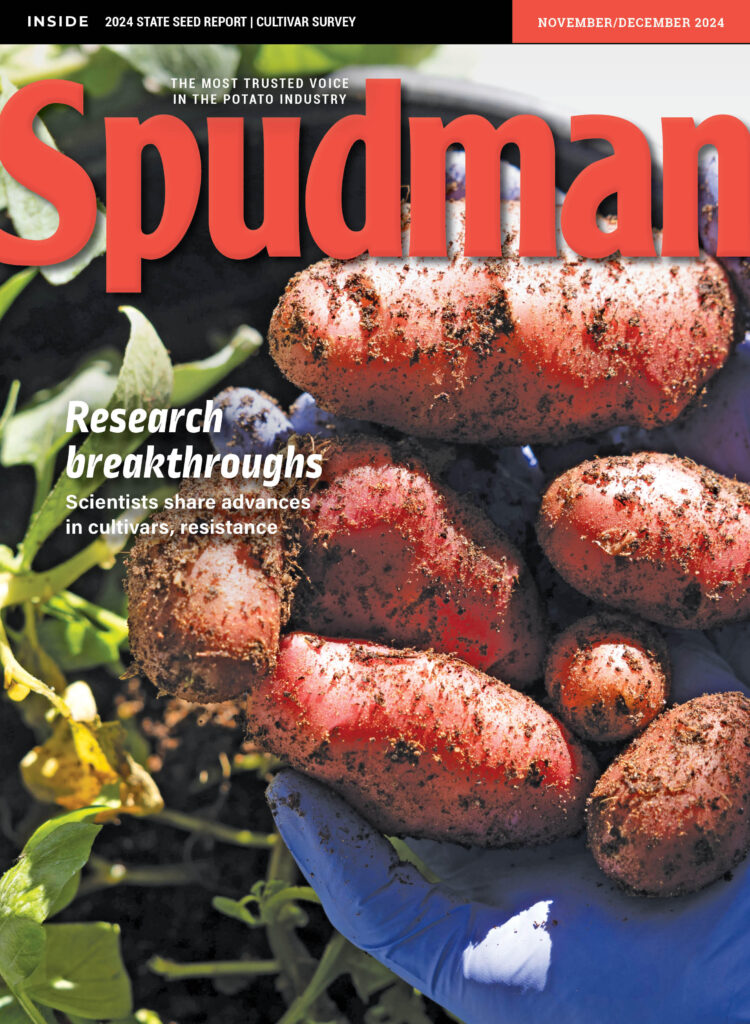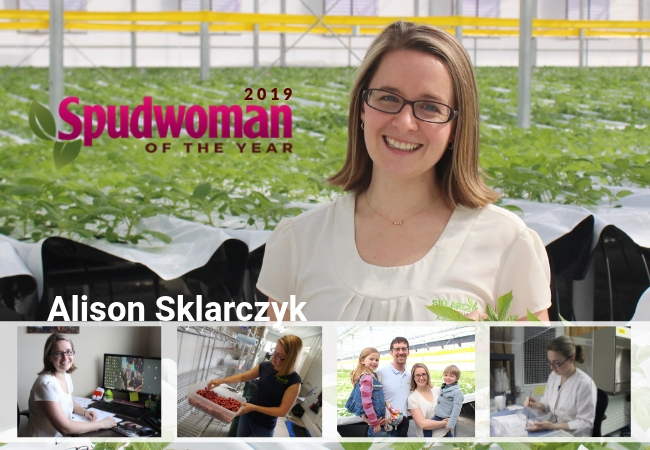
2019 Spudwoman of the Year Alison Sklarczyk
Nurturing potatoes was not how Alison Sklarczyk envisioned her future. Nurturing puppies was more like it.
When Alison Hinshaw entered Michigan State University in 2001, she had her sights set on becoming a veterinarian. Even after marrying Ben Sklarczyk shortly after finishing college, Alison had no intention of being a part of her in-laws’ business, Sklarczyk Seed Farm.
Family, faith and circumstances are powerful forces, however, and they proved to have other ideas. Today, Alison Sklarczyk is not only part of Sklarczyk Seed Farm, she and Ben own it after buying the business from Don Sklarczyk, Ben’s father.
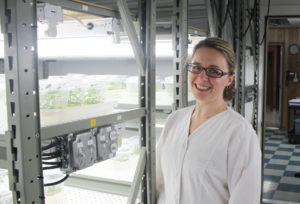
In many ways, Alison is the glue of the business. She’s the tissue culture lab manager, bookkeeper, oversees human resources and provides leadership in the community and potato industry.
For her work in the lab, the greenhouse, community and industry, as a whole, Alison Sklarczyk has been voted the 2019 Spudwoman of the Year sponsored by Lockwood Manufacturing.
“Her commitment to her customers, colleagues, family and community is apparent in everything that she does,” said Melissa Boersema, the research and development manager at Sklarczyk Seed Farm. “Alison regularly supports continuing education and mentorship for her staff and dedicates her time to supporting her community and family.
“As a successful woman in the potato industry, strong wife and mother of two, Alison represents the very best of us.”
Sklarczyk and the team produce six million mini-tubers every year that are sent to seed farmers around the world. The process all starts in the tissue culture lab before they’re moved to the 50,000 square feet of greenhouse space before being sorted and eventually shipped.
“We were at a Michigan State football game that was almost sold out; you can’t even see the faces of the people across the stadium,” Alison Sklarczyk said. “Ben said, ‘Do you realize that probably every person in this stadium has eaten something we grew.’
“That’s pretty amazing.”
International sales have increased 16% over the past three years. The Sklarczyks keep a world map at their facility with tacks to represent everywhere they ship mini-tubers, mostly to keep in perspective how important what they produce is to so many.
“It’s a worldwide impact what we’re doing and a lot of times, myself included, you forget that,” she said. “It’s really humbling.”
Thirst for knowledge
After a decade in the lab, Sklarczyk is quite comfortable within its confines. Comfortable, but not complacent. She is a big believer in the lean time management system.
“We try to look at all aspects — how can we do things more efficiently to save money and resources, but also time,” Sklarczyk said. “A big one (we) implemented was in the lab we used to always put 20 plants into a container. What happens if we put 24 or 30? You’re opening containers less and being better with our time.”
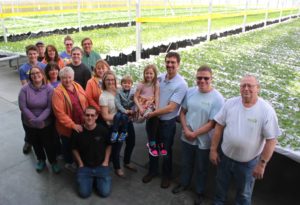
Outside of the lab, Sklarczyk has taken over the business finances in recent years. Although her work background and education are both in science, she sees business as another opportunity to learn.
“I’ve always felt if I’m not learning something, my brain feels stagnant and I hate that feeling,” she said. “(Running the finances) has allowed me to take some finance classes and the (Potato Industry Leadership) Institute and to keep learning more about how to grow tissue culture plants or how to ship tissue culture plants.
“It’s been really fun.”
Another way Sklarczyk is pushing herself is by getting more informed and involved with policies and regulations that affect the industry, something she admits is outside her comfort zone. She’s a National Potato Council delegate and recently was selected to serve on the board of the regional Farm Service Agency.
“It is not a huge time commitment, but I think I can help our business and also the whole agricultural (sector) in the area by learning more about what’s going on,” she said. “I found out that my grandfather served on his local FSA committee for several years in central Indiana. He died when I was young, so it’s neat to learn about the connections I share with my grandparents.”
Finding potatoes
Both of Sklarczyk’s parents, Craig and Carol Hinshaw, were elementary school teachers. One set of grandparents were farmers in central Indiana, however.
“We would spend the summers with them playing with the sheep and riding in the tractors,” Sklarczyk recalled. “My parents are both really outdoorsy and let us go with the mentality if we could catch it, we could keep it, at least for a minimal amount of time. Baby bunnies, snakes, turtles, whatever — we always had a rotating menagerie at home.
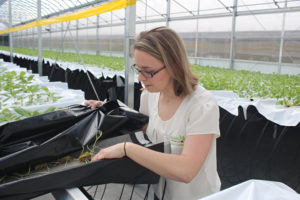
“I would say my love of livestock and farming probably comes from my grandparents.”
While Sklarczyk wanted to be a veterinarian when she arrived at Michigan State, once she realized all of the different avenues of animal science, she turned her focus toward livestock. After graduating and getting married to Ben, who already had plans to follow his parents’ footsteps and get into potato seed farming, Alison worked briefly at the seed farm until she found work as a veterinary assistant.
“When we got married in 2005, I started working here only as a placeholder until I found something else,” Sklarczyk said. “(Ben) knew that. This was a very temporary job; I didn’t want to work here.”
Alison loved working with animals and it gave her — self-described as “independent” and “strong-willed” — a chance to forge an identity away from the farm. She and Ben and Ben’s parents all lived in close proximity.
As much as she enjoyed her job, something began gnawing at her. It was like a calling to go back to the farm.
“I fought it; I did not want to be part of the family business,” she said. “Finally, I couldn’t fight the decision that I should be back here. So, I sat down with Ben and his parents and we decided there was a spot for me where I could work with Ben’s mom (Mary Kay) in the lab.”
Alison served as a field technician and lab assistant at Michigan State, so there was an obvious fit.
‘A family award’
Six months after Alison returned to Sklarczyk Seed Farm to work in the lab, the person who started the tissue culture lab and had been the only person ever to manage it, Mary Kay Sklarczyk, was diagnosed with breast cancer.
For Alison, everything became clear.
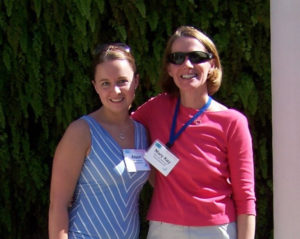
“I was working with her for six months, I was completely comfortable with all the procedures and everything and she was diagnosed with cancer,” Alison said. “OK, so that was God bringing me back here so I could manage things while she focused on treatment. Once everything fell into place, I completely understood. There was no looking back and I knew I was where I was supposed to be.”
After battling the disease for nearly three years, Mary Kay died in October 2011 at the age of 56.
Upon learning she had been voted Spudwoman of the Year, Alison Sklarczyk said, “This is a family award.
“I feel like this would have to be shared with Ben’s mom,” Sklarczyk said. “She was the one who taught me everything in the lab and she was so, so vital in getting this business started with Don. I really feel like if she was still living, this would have been her award at some time in her life.
“She was very committed and dedicated to this business and the industry as a whole.”
Sklarczyk also acknowledged her parents, who often travel with her, Ben and their two young children to industry events and meetings.
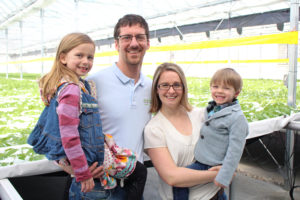
Ben Sklarczyk isn’t surprised his wife has exceled in the industry.
“I knew if there was a desire on Alison’s part, she had the ability to do it,” he said. “She is extremely smart and extremely driven.”
With two dozen year-round employees and another dozen or so that join on during the summer, Sklarczyk Seed Farm is actually the second-largest employer in the small northern Michigan community, outside of the school system.
“It takes a whole team to make someone be successful,” Sklarczyk said. “I feel like our entire team — whether the men or the women — it takes a family in this business, and we are definitely a family.”
RELATED: Photo gallery of Sklarczyk Seed Farm
Sklarczyk said the people is the part of her profession that she enjoys most.
“My favorite part is working with our team and the customers,” she said. “The industry, in itself, is an amazing group of people.”
The Spudwoman of the Year Award is sponsored by Lockwood Manufacturing.
![]() “Lockwood would like to congratulate to Alison Sklarczyk on her accomplishments and dedication to the potato industry,” said Michel Nilson, business unit manager and chief engineer, Lockwood Manufacturing. “We are honored to have the opportunity to support and sponsor the Spudwoman of the Year program and wish Alison the best of luck as she continues to make outstanding achievements. Our mission is driven by and for the potato grower and we are proud to recognize all the dedicated women and men of our industry. Congrats, Alison! We are grateful for your talent in the potato industry!”
“Lockwood would like to congratulate to Alison Sklarczyk on her accomplishments and dedication to the potato industry,” said Michel Nilson, business unit manager and chief engineer, Lockwood Manufacturing. “We are honored to have the opportunity to support and sponsor the Spudwoman of the Year program and wish Alison the best of luck as she continues to make outstanding achievements. Our mission is driven by and for the potato grower and we are proud to recognize all the dedicated women and men of our industry. Congrats, Alison! We are grateful for your talent in the potato industry!”
The Alison Sklarczyk File
- Job: Co-owner and culture tissue lab manager of Sklarczyk Seed Farm in Johannesburg, Michigan. Sklarczyk Seed Farm produces six million mini-tubers a year. It currently produces about 120 varieties.
- Hometown: Davison, Michigan
- Education: B.S., animal sciences, Michigan State University
- Organizations: National Potato Council delegate, Potato Industry Leadership Institute (PILI) participant, regional Farm Service Agency committee, secretary of the Otsego Wildlife Legacy Society and T-ball coach. Sklarczyk also sits on the Otsego Community Foundation’s Community Grant Committee/Grant Review Panel on behalf of the Otsego County Wildlife Legacy Society. She is a member of Gaylord Evangelical Free Church.
- Family: Husband Ben; children Morgan, 6, and Dane, 4
- Favorite way to eat potatoes: “My mom’s cheesy potatoes, but I love them baked, mashed, au gratin — any way really.”
Past Spudwoman of the Year winners
2018: Melanie Wickham, Empire State Farms
2017: Addie Waxman, 1,4GROUP







